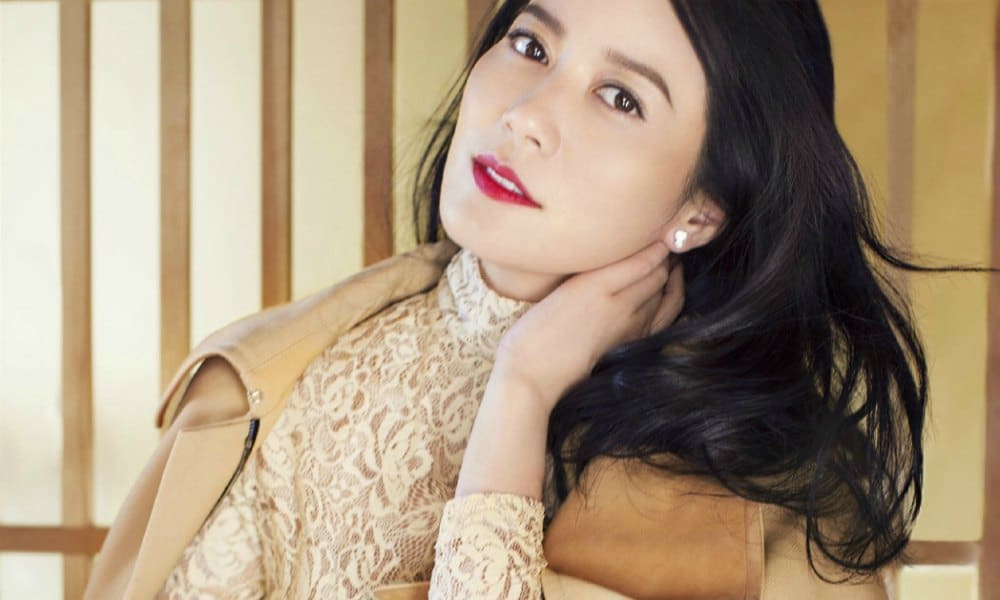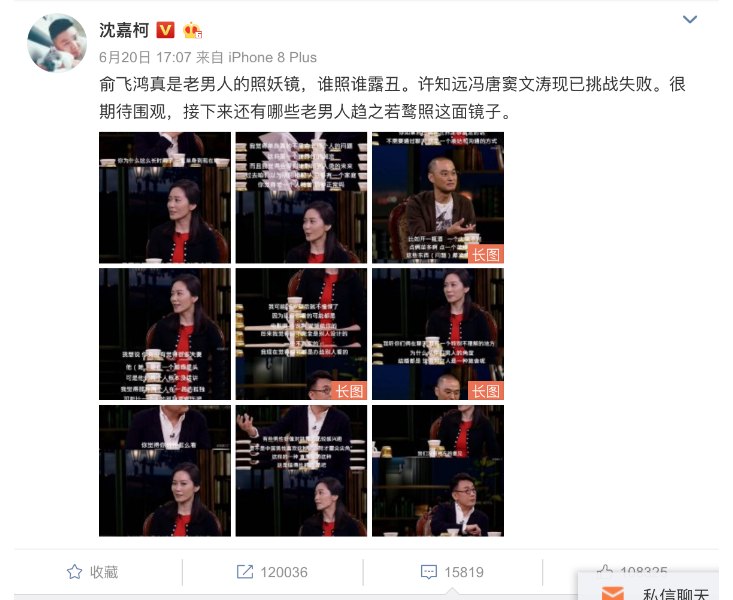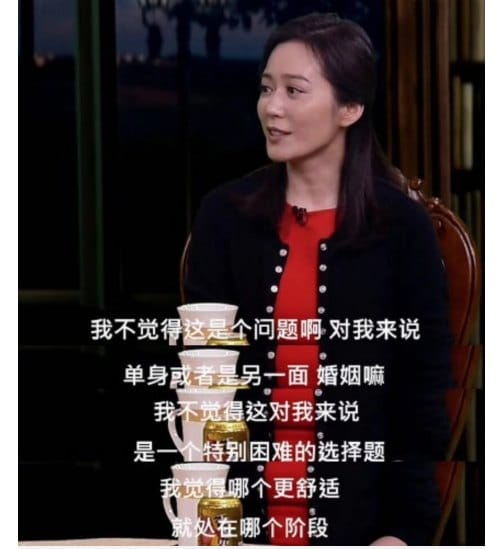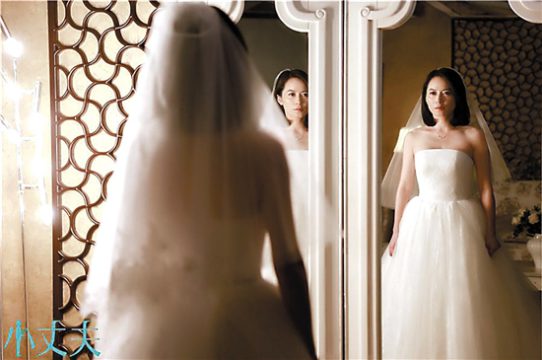Featured
Defying Spinster Stereotypes: Why Chinese Unmarried Women are Rooting for Actress Faye Yu
Chinese actress Faye Yu has become a social media hit because of her views on love and marriage.
Published
7 years agoon

The unconventional attitudes on love & marriage of the unmarried 47-year-old actress Faye Yu have taken Chinese social media by storm. In a society where women are facing real pressures to get married, many welcome Yu’s refreshing perspectives.
With contributions from Miranda Barnes.
Chinese actress Yu Feihong (俞飞鸿, born 1971), also known as Faye Yu, has recently become a big topic of discussion on Chinese social media for her refreshing perspective on marriage and singlehood.
The 47-year-old unmarried celebrity was previously on various Chinese talk shows hosted by older (male) presenters, who questioned the actress about her single status. These shows include ‘Behind the Headlines‘ (锵锵三人行) and and ‘Thirteen Invitations’ (十三邀), hosted by Xu Zhiyuan (许知远).

Faye Yu
Yu became a social media hit when popular writer Shen Jiake (@沈嘉柯), on June 20, posted images and quotes of her on the talkshow ‘Behind the Headlines,’ which was hosted by two men Dou Wentao and guest Feng Tang.
The various quotes show how Yu, in a relaxed and matter-of-fact way, addresses questions about her being unmarried, expressing that she does not need a partner to fulfill her needs, and that she did not feel she wants or needs to adapt her life to existing social expectations on the right age to get married.
Within a time frame of three days, the post has been reposted on Weibo over 120,000 times, receiving more than 100,000 likes. Other posts dedicated to Yu’s appearance on the shows have also attracted hundreds of comments and reposts.

Faye Yu became a social media hit after Shen Jiake posted these images of her appearance in a talk show.
Some of these screenshots include the following:

Presenter Dou Wentao: “Why have you already been single for so long?”

Faye answers: “I don’t think it’s a problem. For me whether to be single or married is not a difficult choice. Whatever stage I find more comfortable, is the stage I’ll choose to be in.“
Author Shen Jiake says about Yu: “Yu Feihong (俞飞鸿) really mirrors [these] old men’s own demons*, making a fool of their own reflections. Xu Zhiyuan, Feng Tang, and Dou Wentao all have to face their defeat.”
“I am rooting for Yu Feihong, she expresses my feelings!”
Over the past few days, thousands of people on Weibo comment on Yu’s attitude and previous interviews. Many of them are young and female.
In recent years, much has been written and discussed on the pressures Chinese women are facing today when it comes to marriage, and their risk of being stigmatized as a ‘spinsters’, ‘leftover women‘ or ‘shengnu‘ when they are older than 25 and still single.
In 2016, an SK-II skincare ad campaign titled ‘She Finally Goes to the Marriage Corner’ became a huge trending topic on Chinese social media. The ad video focused on Chinese single women, pressured to get married by their families and society, who pluck up the courage to speak out towards their parents against the burdens they face.

The SK-II video about China’s ‘leftover women’ that became a hit in 2016.
The online hype around Faye Yu shows similarities with the SK-II topic, and reveals that for many women in China today the pressure to get married is very real.
Chinese media outlets have also started to report on the Faye Yu hype, headlining: “Why are young people suddenly such fans of the 47-year-old Yu Feihong?” The trend is especially noteworthy because the talkshow appearances that have gone viral were recorded a time ago; ‘Behind the Headlines’ is a show that has already been canceled since 2017.

“Why have young people suddenly become such fans of Yu Feihong?”
“There is no age one should get married, there’s just an age one feels they should get married” (“没有该结婚的年龄,只有该结婚的感情), Weibo blogger Yan Wangye (@颜王爷) writes.
“I am rooting for Yu Feihong, she expresses my feelings!”, a typical comment says. “She’s just cool. Beautiful and cool,” others say.
But there are also many men responding to the topic. Famous designer ‘Teacher Kevin’ (@Kevin凯文老师) says: “I really appreciate Yu Feihong’s attitude on marriage: marriage is not a woman’s necessity. To be married or to be single is a personal choice, completely depending on what makes you more comfortable.”
“I have my own concept of marriage.”
Yu Feihong has been in the Chinese showbusiness since she was a child and has starred in dozens of movies since. Outside of China, she is mostly known for her role in the Joy Luck Club (1993). Many of these movies are about romance, and her own love life has been a topic of interest for Chinese journalists for years, especially because Yu is known as China’s “most beautiful woman above the age of 40.”

Faye Yu has worn a wedding dress in many of her movies, but not in real life.
In a 2016 interview with Phoenix News, Yu says: “By the time I was 20 years old, I was instilled with the concept of marriage by society and my family. But up to the present day, I will not simply accept a concept given to me by others. I have my own concept of marriage.”
In the interview, she says she has a stable partner, but does not feel the roles of “wife” or “mother” suit her lifestyle: “I don’t reject it, but I don’t feel it is something I need to attain in this life.”
“She says it so well,” one Weibo commenter writes: “I am a proponent of singlehood, although I do not oppose to marriage. I just feel we shouldn’t enter marriage within such a restricted time frame. This is a state of mind that is not welcomed or accepted by the majority of people.”
“I am not married for the mere reason that I do not want to be married yet,” another person says. “It is just so fascinating to see someone with such an independent way of thinking,” others say.
Besides praising Yu’s courage, there are also many who condemn Chinese men such as the talk show hosts Dou Wentao or Feng Tang who do not hesitate to question unmarried women such as Yu about their single status – even suggesting that being single and “being lonely” are practically the same thing.

Feng Tang about being single: “But you won’t finish a bottle of wine alone, and if you order food, two dishes might be too much but one dish is never enough. Aren’t you bothered by these kinda things?” Faye responds: “I really don’t have any problems with that.”
Many call these male presenters’ questioning a sign of ‘male chauvinism’ or, literally: ‘straight man’s cancer’ (直男癌). “I applaud Faye Yu’s patience to deal with these kinds of boring questions,” some say.

Faye Yu: “Listening to you guys talking, there’s one thing I don’t get – why, from a man’s point of view, is marrying something you seem to do out of some sort of charity for women?”
“I just really like Yu’s view on life,” another netizen writes: “Whether you’re single or married, the most important thing is to be your own independent person.”
Want to read more? Check out “The Shengnu Dilemma: (Don’t) Marry Before You’re 30.”
By Manya Koetse
Follow @whatsonweibo
Contributions from Miranda Barnes
* The term he literally used is ‘照妖镜’ (“老男人的照妖镜”), which means a “magic mirror for revealing goblins.”
Spotted a mistake or want to add something? Please let us know in comments below or email us.
©2018 Whatsonweibo. All rights reserved. Do not reproduce our content without permission – you can contact us at info@whatsonweibo.com.
Manya is the founder and editor-in-chief of What's on Weibo, offering independent analysis of social trends, online media, and digital culture in China for over a decade. Subscribe to gain access to content, including the Weibo Watch newsletter, which provides deeper insights into the China trends that matter. More about Manya at manyakoetse.com or follow on X.

China Memes & Viral
From Nobel Farewell to ‘VIP Toilets’: What’s Trending in China
From a tragic “wild child” case in Yunnan to the farewell of Nobel laureate Yang Chen-Ning, here’s what’s trending on Weibo and beyond this week across Chinese social media.
Published
22 hours agoon
October 19, 2025
🔥What’s Trending in China This Week (Week 42, 2025)? Stay updated with China Trend Watch by What’s on Weibo — your quick overview of what’s trending on Weibo and across other Chinese social media.
1. “Wild Child” from Yunnan Sparks Concern and Investigation

Screenshots circulating on Chinese social media showing the “wild child” in Yunnan.
A tragic and widely discussed story from Yunnan has been trending on Weibo this week, centering on a 3-year-old boy from Nanjian County who was spotted near a highway service area — naked, neglected, and walking on all fours. Online videos led Chinese netizens to dub him the “feral child.”
There have been conflicting media reports on the case over the past few days. From The First Scene (@第一现场) to Shanghai Reporter (上观新闻) some claimed the child’s parents are impoverished and jobless while others reported the father and mother are actually highly educated and do have resources, but that the choice to raise their child like this is related to lifestyle philosophy. The parents reportedly insisted that the child used to suffer from eczema and found clothes irritating and painful, so “he doesn’t like wearing clothes.”
One thing that local villagers quoted in these reports agree on is that the situation is “not normal.” The child, who never wears clothing, allegedly mimics animal behavior and refuses to eat from his hands — preferring to eat food off the ground. Locals previously already villagers reported the situation to the police.
Authorities in Nanjian County have announced the creation of a special task force to investigate this case. Officials said no signs of human trafficking were found, and that the parents are currently outside Yunnan Province. According to Beijing Youth Daily, The child and his parents are now under supervision, although it is not clear what this actually means – since other sources say the parents are not willing to cooperate. They also have another boy, who is currently one year old. Authorities have also investigating whether the parents’ behavior constitutes a crime.
Manya’s Take:
The “wild child” story brings back memories of the Xuzhou mother of eight. That heartbreaking case also gained national attention after netizens shared a video showing a woman chained up in a shed next to her family home. The chaotic media coverage of that case mirrors what we’re seeing now: media outlets are quick to jump on the story, while local authorities — feeling public anger and pressure — rush to investigate, resulting in conflicting reports, rumors, and fake news. Both situations involve rural counties that would otherwise hardly ever make headlines, with local authorities often unequipped to handle such crises quickly. Hopefully, there will be a clearer update on this story soon.
2. China Responds to Trump’s Remarks on Soybean Trade and Cooking Oil

Soybeans have been trending this week. As China is boycotting American soybeans – the fourth most sold agricultural product from the country – farmers in the US are facing uncertain times, as it’s harvesting season and the biggest purchaser of soybean exports is China.
On Tuesday, Trump wrote on Truth Social that China was “deliberately halting U.S. soybean imports,” calling it an “economically hostile act.” He also threatened to terminate business with China regarding cooking oil and other areas of trade as retribution.
On Chinese social media, people seemed unimpressed. The term TACO is also seen more often, a popular abbreviation for “Trump Always Chickens Out.” The Foreign Ministry dismissed Trump’s claims as “unfounded” and emphasized China’s commitment to normal trade relations. On Weibo, commentator Hu Xijin wrote: “Haha, so he [Trump] slaps tariffs on China and blocks chip exports and that’s not considered ‘hostile’? But when China doesn’t buy soybeans, suddenly it is? What kind of logic is that!”
Manya’s Take:
Chinese netizens are treating this latest trade exchange with irony rather than outrage, not only viewing it as a sign of US inconsistency on trade but also there’s some banter about the ‘cooking oil’ threat: when the US side talks about banning imports of “Chinese cooking oil” many assume they meant edible oil (食用油), while what the US actually imports from China is used cooking oil (UCO, 废食用油/地沟油) — waste oil that’s recycled to make biofuels. So the joke is that even Trump himself is seemingly mixing up cooking oil and used cooking oil, moreover threatening a ban that would hurt itself more than China, turning this trade spat into a moment of internet humor.
3. Nanjing Deji Plaza Faces Backlash Over VIP-Only Restrooms

The exclusive members-only restroom at Nanjing’s Deji Plaza.
Nanjing’s luxury shopping mall Deji Plaza (德基广场) has sparked controversy after introducing members-only restrooms accessible exclusively to VIP members (天象会员) who spend over 200,000 yuan ($28,000) annually. Access requires scanning a Deji membership QR code.
Beyond offering peace and privacy, the restrooms feature Tom Ford vanity sets, Jo Malone handwash, and Dyson hairdryers. One Xiaohongshu blogger (and VIP member) noted, “The maintenance cost here is ten times that of a regular restroom.”
After news of the VIP restrooms went viral, it fueled debate about turning ‘a basic human need’ into a ‘class privilege’ or “privatizing a public facility.” One user commented, “Now even restrooms have to reflect the wealth gap?”
Despite the criticism, curiosity grew — many users purchased “code-scanning services” on secondhand platforms to gain access, quickly undermining the restroom’s exclusivity. In response to the controversy, Deji Plaza stated that the members-only restrooms would soon be dismantled and converted into a regular public facility. Regardless, and despite the backlash, the initiative seems to have been fruitful in terms of brand name recognition, as it got everyone talking about Deji Plaza.
Manya’s Take:
There’s some irony in this story: there’s controversy over a mall toilet being “VIP,” yet at the same time, it’s the exclusivity that makes people want to try it. According to the latest posts on Xiaohongshu (XHS) by Deji Mall visitors, the VIP toilets are already gone, and people are back to complaining about the restrooms being too crowded and dirty. One XHS commenter (西蒙吴) had the best take on the issue: in a time when Chinese media are working to downplay the country’s wealth gap and ease public resentment, Deji Mall made the right move by dismantling the card-access VIP toilets — if not for the pressure of online public opinion, authorities might have stepped in themselves. It was an unwise move simply because it was all about a toilet: unlike VIP waiting areas or service counters, consumers don’t like restrooms being divided by class. A smarter approach would have been to create a VIP lounge that just happens to include a restroom.
4. Arc’teryx Responds to Tibet Fireworks Show Environmental Damage Investigation

The controversial fireworks show held in Tibet on September 19.
This is a topic that has sparked outrage and continued discussion in China over the past weeks. On September 19, a major fireworks event was held at an altitude of around 5,500 m or 18,000 feet in Tibet’s Himalayas, created by famous Chinese artist Cai Guoqiang (蔡国强) and sponsored by the outdoor brand Arc’teryx.
The 52-second show, titled “Ascending Dragon” (升龙) was supposed to impress people for its spectacular and colorful use of 1,050 fireworks, but it triggered outrage instead: critics blasted it as tone-deaf commercialization and ecological abuse of sacred and fragile land, and soon an investigation was launched.
Now, the outcome of that investigation has also become a major talking point as it revealed disturbance to local wildlife and caused significant environmental damage of over 30 hectares of grassland.
Cai Guoqiang and his studio will be held legally accountable for environmental damage, and Arc’teryx, as a sponsor of the event, will also bear legal responsibilities. Furthermore, the relevant county officials who had initially approved the show without going through the proper channels are also punished: Party Secretary Chen Hao (陈浩) has been dismissed, and nine other county officials received formal penalties ranging from removal to warnings.
Manya’s Take:
A lot has already been said and written about this controversy. What it comes down to, in the public perception in China, is that the high ambitions and personal goals of the artist and the Arc’teryx brand — which built its image around environmental responsibility and authentic outdoor culture — were pursued at the expense of Tibet’s fragile environment and marginalized communities. Their so-called “dreamlike” event left lasting scars for a fleeting 52-second spectacle. More than just serving as a warning for brands to ensure their actions align with their “eco-friendly” promises, this entire case will undoubtedly go down in history as a moment of awareness — a case study for future art events and large-scale performances in nature in China — on what not to do, and on how to balance spectacle with responsibility.
5. Nobel Laureate Yang Chen-ning Passes Away at 103

Yang Chen-ning passed at the age of 103.
The death of the renowned Chinese theoretical physicist Yang Zhenning (杨振宁, 1922), also known internationally as Chen-Ning Yang, China’s first Nobel laureate in physics, has been trending across Weibo, Douyin, Zhihu, and Toutiao in recent days. Yang passed away in Beijing on October 18, 2025, at the age of 103, just weeks after celebrating his birthday on October 1.
On social media, Yang is remembered as a legendary physicist who devoted his life to science and truth. He shared the 1957 Nobel Prize in Physics with Li Zhengdao (李政道) for discovering parity violation in weak interactions, and co-developed the Yang–Mills theory with Robert Mills in 1954, a cornerstone of modern particle physics.
Many online tributes also recall Yang’s lifelong friendship with nuclear physicist Deng Jiaxian (邓稼先, 1924–1986). The two met in middle school and went on to become giants of Chinese science. Yang’s wife, Weng Fan (翁帆), has also become part of the online remembrances. Over 50 years his junior, she met Yang while she was a student; they married when she was 28 and he was 82. Her tribute to Yang, expressing gratitude for having shared his company for many years, has received over 140 million views on Weibo.

Manya’s Take:
There is certainly a strong sense of national pride in the accomplishments of Yang Chen-Ning, but on social media, much of the attention also centers on his relationship with his wife, who was 54 years younger. Many see Yang’s passing as a moment of reflection — was she there for the money and fame, or for love? Opinions are divided, but the fact remains that the two were married for over twenty years, and she stayed by his side throughout. Some argue that Yang was simply so extraordinary, in both mind and body, that he naturally connected with younger people — and they with him. Others say their love was “timeless,” that true soulmates (灵魂伴侣) do not see age. Either way, it’s clear that 2025 netizens aren’t all cynics — there are quite a few romantics out there.
Spotted a mistake or want to add something? Please let us know in comments below or email us. First-time commenters, please be patient – we will have to manually approve your comment before it appears.
©2025 Whatsonweibo. All rights reserved. Do not reproduce our content without permission – you can contact us at info@whatsonweibo.com.
China Travel
From Tents to ‘Tangping Travel”: New Travel Trends among Young Chinese
Did tents defeat China’s hotel industry during the National Day holiday?
Published
5 days agoon
October 15, 2025
🔥 Quick Take: Trending in China
This is a brief update from our curated roundup of what’s trending in China. A version of this story also appears in the Weibo Watch newsletter. Subscribe to stay in the loop.
Now that China’s combined National Day and Mid-Autumn Festival holiday (国庆 + 中秋) has ended, social media has seen a surge in discussions about major 2025 travel trends. According to the Ministry of Culture and Tourism, a lucky total of 888 million domestic trips were made during the eight-day holiday.
While many Chinese cities and regions focused on offering innovative experiences — from lantern festivals to street performances — to attract travelers, there was also a grassroots trend that stood out.
Especially among the 18-35 age group, more Chinese are now choosing tents over hotels. On October 10, Business Times China (财经时报) featured an article about how ‘tents’ are putting a ‘dent’ into China’s hotel industry (title: “Did Tents Defeat the Hotel Industry during the National Day Holiday? 这个十一假期,打败酒店行业的是帐篷”).
Over recent years, as domestic travel has boomed, hotel prices in China have skyrocketed during holiday periods, with rates often doubling or tripling. For many—particularly younger travelers—this has made trips less affordable and less worthwhile. (Average nightly prices for mid- to high-end hotels in major cities exceeded 800 RMB / $112 this season.)
So what are we seeing now?
🔸 People are looking for alternative overnight stays, even though some hotels have lowered their prices in light of disappointing bookings.
🔸 Bathhouses are one example: many bathhouses or spas in China have become all-in-one leisure complexes combining hot springs, saunas, massages, dining, entertainment, and overnight lodging—becoming a new competitor for hotels (dubbed 洗浴旅游, “bathhouse tourism”).

Luxury bathhouses aren often opened 24/7 and have come a popular destination among young travelers.
🔸 Tents are growing in popularity. The outdoor equipment industry is seeing explosive growth in China, and Business Times China connects this growth to consumer backlash against unreasonable prices and poor service in Chinese hotels, seeing a future for more luxury camping models.

🔸 But it’s not just luxury camping. Many netizens across China have shared videos of travelers setting up tents and sleeping outdoors by roadsides or in scenic spots. Not only are people enthusiastic about outdoor camping and the experience itself, they also see it as a “consumption awakening” (消费觉醒), where younger generations are not willing to blindly pay ten times more for one night in a hotel than the purchase of a tent.
🔸 Another term that has been popping up more frequently is “Tangping Travel” (躺平式旅游). Tangping means “lying flat,” a phrase often used by young Chinese who “lie flat” as a way to cope with social pressure and competitive stress (read more). Unlike previous travel trends, where “special forces travelers” would rush to clock in at as many destinations as possible in a short time, tangping travel — whether in bathhouses, hotels, or tents — is about doing as little as possible, reflecting a shift away from hectic travel schedules.
By Manya Koetse
(follow on X, LinkedIn, or Instagram)
Spotted a mistake or want to add something? Please let us know in comments below or email us. First-time commenters, please be patient – we will have to manually approve your comment before it appears.
©2025 Whatsonweibo. All rights reserved. Do not reproduce our content without permission – you can contact us at info@whatsonweibo.com.
Subscribe
What’s on Weibo is a reader-supported publication, run by Manya Koetse (@manyapan), offering independent analysis of social trends in China for over a decade. To receive new posts and support our work, consider becoming a paid subscriber.

Get in touch
Would you like to become a contributor, or do you have any tips or suggestions? Get in touch here!

From Nobel Farewell to ‘VIP Toilets’: What’s Trending in China

From Tents to ‘Tangping Travel”: New Travel Trends among Young Chinese

House of Wahaha: Zong Fuli Resigns

How the “Nexperia Incident” Became a Mirror of China–Europe Tensions

China Faces Unprecedented Donkey Shortage Crisis

“Jiangyou Bullying Incident”: From Online Outrage to Offline Protest

The Rising Online Movement for Smoke-Free Public Spaces in China

China Trend Watch: Pagoda Fruit Backlash, Tiananmen Parade Drill & Alipay Outage (Aug 11–12)

From Schadenfreude to Sympathy: Chinese Online Reactions to Charlie Kirk Shooting

Passing the Torch from ‘Ne Zha’ to ‘Nobody’: China’s Box Office Poster Relay Tradition
Popular Reads
-

 China Memes & Viral3 months ago
China Memes & Viral3 months agoHidden Cameras and Taboo Topics: The Many Layers of the “Nanjing Sister Hong” Scandal
-

 China Books & Literature12 months ago
China Books & Literature12 months agoThe Price of Writing Smut: Inside China’s Crackdown on Erotic Fiction
-

 China Insight6 months ago
China Insight6 months agoUnderstanding the Dr. Xiao Medical Scandal
-

 China Memes & Viral10 months ago
China Memes & Viral10 months agoOur Picks: Top 10 Chinese Buzzwords and Phrases of 2024 Explained




LGBTspreadAIDS
June 24, 2018 at 7:38 am
she is probably LGBT and drinks from the furry cup.
Xavier
August 4, 2018 at 2:40 am
@LGBTspreadAIDS
How in the world does not wanting to get married have anything to do with LGBT? I frankly don’t care about getting married and I’m totally straight. So what’s your point?